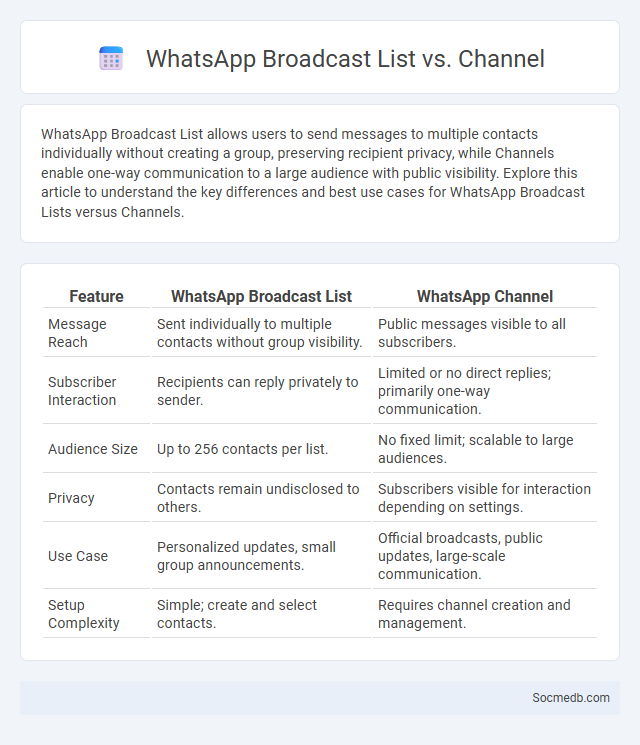
Photo illustration: WhatsApp Broadcast List vs Channel
WhatsApp Broadcast List allows users to send messages to multiple contacts individually without creating a group, preserving recipient privacy, while Channels enable one-way communication to a large audience with public visibility. Explore this article to understand the key differences and best use cases for WhatsApp Broadcast Lists versus Channels.
Table of Comparison
| Feature | WhatsApp Broadcast List | WhatsApp Channel |
|---|---|---|
| Message Reach | Sent individually to multiple contacts without group visibility. | Public messages visible to all subscribers. |
| Subscriber Interaction | Recipients can reply privately to sender. | Limited or no direct replies; primarily one-way communication. |
| Audience Size | Up to 256 contacts per list. | No fixed limit; scalable to large audiences. |
| Privacy | Contacts remain undisclosed to others. | Subscribers visible for interaction depending on settings. |
| Use Case | Personalized updates, small group announcements. | Official broadcasts, public updates, large-scale communication. |
| Setup Complexity | Simple; create and select contacts. | Requires channel creation and management. |
Understanding WhatsApp Broadcast Lists
WhatsApp Broadcast Lists enable users to send messages to multiple contacts simultaneously without creating a group chat, preserving individual privacy and personalization. This feature is ideal for businesses and social media managers aiming to share announcements, promotions, or updates efficiently with targeted audiences. Understanding the limitations, such as recipients needing to have the sender saved in their contacts, is crucial for maximizing broadcast list effectiveness.
What Are WhatsApp Channels?
WhatsApp Channels are a feature designed for one-way broadcasting of messages to large audiences, enabling businesses and creators to share updates, promotions, and content directly on the WhatsApp platform. Unlike group chats, Channels allow administrators to send messages without recipients responding, ensuring streamlined communication and enhanced privacy. This feature leverages WhatsApp's encryption and extensive user base, optimizing brand engagement and audience reach.
Key Differences: Broadcast List vs Channel
A broadcast list on social media allows users to send messages individually to multiple contacts without revealing recipients to each other, ideal for personalized communication. In contrast, a channel serves as a one-to-many platform where content is broadcasted publicly or to a vast subscriber base, enabling wide-reaching announcements and updates. Broadcast lists prioritize privacy and direct engagement, while channels emphasize mass communication and audience growth.
How WhatsApp Broadcast Lists Work
WhatsApp Broadcast Lists enable users to send messages to multiple contacts simultaneously without creating a group, maintaining individual privacy. Each recipient receives the message as a direct chat, unaware of other recipients, which enhances personalized communication. Users can only send broadcast messages to contacts who have saved their number, ensuring targeted and mutually connected networking.
Pros and Cons of Broadcast Lists
Broadcast lists on social media streamline communication by allowing users to send messages to multiple recipients simultaneously without creating group chats, enhancing privacy and reducing clutter. However, their limitations include lack of real-time interaction and the potential for recipients to miss important updates due to the one-way nature of messages. Effective use of broadcast lists can boost marketing reach and customer engagement but requires careful management to avoid appearing spammy or impersonal.
Features and Benefits of WhatsApp Channels
WhatsApp Channels offer a streamlined way for businesses and creators to broadcast updates directly to a wide audience without the noise of traditional group chats, ensuring your messages reach users efficiently. Features include real-time notifications, rich media sharing, and analytics tools that help you track engagement and tailor content. By leveraging these tools, you can enhance communication, build stronger relationships, and expand your reach on one of the world's most popular messaging platforms.
Use Cases: When to Use Broadcast Lists
Broadcast lists on social media are essential for sending targeted updates to multiple contacts simultaneously without creating group chats, making them ideal for businesses announcing promotions or event reminders. They enable personalized communication at scale, preserving recipient privacy by preventing others from seeing the list members. Marketers and customer support teams leverage broadcast lists to efficiently distribute newsletters, product launches, and service updates, maximizing reach and engagement.
Use Cases: When to Use Channels
Social media channels are ideal for customer engagement, brand awareness, and targeted marketing campaigns, enabling businesses to reach specific audiences effectively. You should use platforms like Instagram for visual storytelling, LinkedIn for professional networking, and Twitter for real-time updates and customer service. Each channel offers unique tools to optimize content delivery and maximize user interaction based on your business goals.
Privacy and Security: Broadcast List vs Channel
When managing your online presence, understanding the privacy and security differences between Broadcast Lists and Channels is essential. Broadcast Lists allow you to send messages privately to multiple contacts without exposing recipients to each other, enhancing confidentiality and control over who sees your content. Channels, however, are designed for one-way communication to a broad audience, often making subscriber lists and message reach less secure and more public.
Choosing the Right Tool for Your Messaging Strategy
Selecting the right social media platform significantly impacts the effectiveness of your messaging strategy by targeting the appropriate audience demographics and content formats. Platforms like Instagram and TikTok excel in visual storytelling for younger audiences, while LinkedIn suits B2B communication and professional networking. Analyzing engagement metrics and audience behavior on each platform ensures your message resonates and drives desired outcomes.
 socmedb.com
socmedb.com